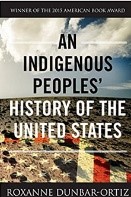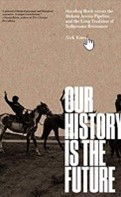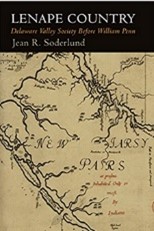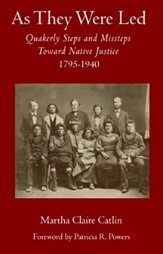Plymouth Monthly (Quaker) Meeting's Journey
to
Right Relationship with Indigenous Peoples
Plymouth Meeting Friends are acutely aware of the settler driven history of our country that violently removed Indigenous peoples from their land and actively worked to erase their culture and history. We seek to understand the role that the Religious Society of Friends played in that history. We seek to recreate relationship with all Indigenous peoples to create opportunities of cultural learning, advocating for justice in current Indigenous issues, and joining in the reestablishment of right relationship with The Creation. This webpage provides information to help Friends here at Plymouth and others to begin that journey.
**Note: Click the ► below to open each topic and then, click to close the topic
Land Acknowledgement and Right Relationship Queries: click
here
Click here for Indigenous News and Justice Issues
Penn Treaty Belt Plymouth Meeting House 1708
Introduction to Plymouth Meeting Friends (Quakers) and the Lenape of Lenapehocking
Plymouth Friends early history
Plymouth Monthly Meeting is located in Lenapehocking (homelands of the Lenape - called Delaware Valley by European Settlers). Our Meeting is within the 1685 treaty land "beginning at the hill called Conshohockin, on the River Manaiunck, or Skoolkill'' (near the Lenape village of Umbelicamence). This deed was signed by Sbakahoppoh, Secane, Malibor and Tangoras. (Arch. Pa., I, 92-93, 1852). William Penn, unlike most other European Settlers entered into treaties for the use of the land. Although William Penn's efforts towards right relationship with the Lenape people and other tribes of Pennsylvania yielded peaceful relations during his life time, the difference between the definition of land use - European private ownership and Lenape communal use of land - would define succeeding generations of abusive and violent relationships between Lenapes and Europeans Europeans. Quakers began arriving in the Plymouth area in 1685 after Francis Rawle and James Fox purchased the township of Plymouth. Meetings for worship were held in the home of James Fox. James sold his land to Welsh Friends who settled on both sides of the Skoolkill river forming what the English called the Welsh tract. Plymouth Meetinghouse was built around 1708. Exact date is unknown but the first wedding recorded in the Meetinghouse was 1708.
Lenape introduction
John Norwood writes in, We Are Still Here (p.10): "From many tribal traditions and historians, the Lenape are acknowledged as the ancient “tree trunk”of the North American Indian Nations of the Algonkian (Algonquian) language family, from which many branches have sprung. The oral migration tradition of the Lenape, which is potentially thousands of years old, holds that the ancient migration from the northwest was long, arduous, and left some factions along the way, which developed into independent tribes. By the time they settled the along what would eventually be called the “Delaware River” in the woodlands of New Jersey, southern New York, eastern Pennsylvania, and northern Delaware,the Lenape (also called“Lenni-Lenape”) call themselves the “common” or “original” people,but they are respectfully referred to by many other tribes as the “grandfathers” or “ancient ones. .... The Lenape Confederation is said to have extended from the headwaters of the Hudson to the headwaters of the Potomac and included the Mohican and Nanticoke."
John continued "Divided into three main dialect groups based upon geography, with the Munsee in the northern part of the homeland and the closely related Unami and Unalachtigo in the central and southern regions, the Lenape were dispersed into various related sub-tribes and bands made up of numerous self-sufficient villages along waterways. Socially matrilineal and spiritually monotheistic, the Lenape are honored by their neighboring nations as peacemakers and mediators, but also feared as fierce warriors. During a brief 1524 encounter, Giovanni de Verrazano remarked that the shores of the Land of the Lenape were “densely populated.”
Jean R. Soderland notes in Native Peoples to 1680 - (Encyclopedia of Greater Philadelphia): "The size of the precontact Delaware Valley population is unknown because European sailors and fishermen brought pathogens even before the Dutch arrived (1614). Colonization of Europeans in North America had a devastating impact on the Lenapes and other natives because they lacked immunity to smallpox, influenza, measles, and other diseases. In 1600 the Lenapes numbered an estimated 7,500; by the 1650s their population decreased to about 4,000, and to about 3,000 by 1670. The Lenapes’ population decline was not as severe in the 1600s as among some other groups whose numbers dropped by ninety percent or more."
Over the next 250 years the introduction of disease, increasing European immigration, pressure to trade rights to the use of land, enslavement, scalping for profit murders, and finally violent removals, and village burning drove Lenape and other indigenous nations into exile or hiding.
The journey to right relationship
To come into right relationship we need to:
-
Understand our history with Indigenous peoples
-
Create relationships
-
Advocate for justice in current Indigenous affairs
-
Join in creating right relationship with The Creation and its peoples
Below are resources and projects for use to help us on our path to each step in relationship restoration.
Understand our history and culture of Indigenous peoples
-
Turtle Island creation story to Lenapehocking (Delaware Valley) Click here
-
United States History through a Native Lens - We R Native website: Click here
-
This is an informative interactive timeline broken into Indigenous periods of history
Recommended books and articles:
Native American history and resistance
 An Indigenous Peoples' History of the United States: Roxanne Dunbar-Ortiz
An Indigenous Peoples' History of the United States: Roxanne Dunbar-Ortiz
An Indigenous Peoples' History of the United States for Young People
This book is a history of the United States from the factual events and writings of indigenous people who lived here and were swept aside as Europeans pushed across the country in full belief of their manifest destiny to occupy it. It is not the history of our high school. It is “a history of settler colonialism—the founding of a state based on the ideology of white supremacy, the widespread practice of African slavery, and a policy of genocide and land theft.” This book provides for us ( those of European descent) a window into a history of indigenous peoples – our neighbors – through events that we likely were not taught
 Our History Is the Future: Standing Rock Versus the Dakota Access Pipeline,
Our History Is the Future: Standing Rock Versus the Dakota Access Pipeline,
and the Long Tradition of Indigenous Resistance: Nick Estes
Using the Standing Rock resistance to the Dakota Access Pipeline (2016) the author Nick Estes unfolds the recent events of state supported White Nationalism in the context of the long history of genocidal wars and colonial institutions. This is a book of current “Indigenous protesters fighting to protect their ancestral land and uphold their historic values of clean land and water for all humans.” The wrongs of our prior generations continue today. The statement “Our History is the Future” can be a call for all peoples to create a just future for the people who live today. If the call is not heard the past continues to be repeated with all its injustice.

God Is Red: A Native View of Religion: Vine Deloria Jr. First published in 1972, Vine Deloria Jr.'s God Is Red remains the seminal work on Native religious views, asking new questions about our species and our ultimate fate. Celebrating three decades in publication with a special 30th-anniversary edition, this classic work reminds us to learn "that we are a part of nature, not a transcendent species with no responsibilities to the natural world." It is time again to listen to Vine Deloria Jr.'s powerful voice, telling us about religious life that is independent of Christianity and that reveres the interconnectedness of all living things.
Local Lenape & Quaker History
 Lenape Country: Delaware Valley Society Before William Penn (Early American Studies): Jean R. Soderlund This book provides the history of the Lenape people from the arrival of Europeans to the arrival of Penn. It provides a history of the Lenape people as they interfaced with and developed a mutual relationship with the Dutch, Swedish and Finish traders 50 years before Penn. A relationship not based on taking of land but on trading. This relationship radically changed with the arrival of Penn. The Lenape lived in the area that we now live. Some Lenape people continue to live among us. Their history has not been told and in many cases purposefully destroyed. This book provides a glimpse into a portion of that history.
Lenape Country: Delaware Valley Society Before William Penn (Early American Studies): Jean R. Soderlund This book provides the history of the Lenape people from the arrival of Europeans to the arrival of Penn. It provides a history of the Lenape people as they interfaced with and developed a mutual relationship with the Dutch, Swedish and Finish traders 50 years before Penn. A relationship not based on taking of land but on trading. This relationship radically changed with the arrival of Penn. The Lenape lived in the area that we now live. Some Lenape people continue to live among us. Their history has not been told and in many cases purposefully destroyed. This book provides a glimpse into a portion of that history.

As They Were Led: Quakerly Steps and Missteps Toward Native Justice: 1795-1940: Martha Claire Catlin and Patricia R. Powers Martha Claire Catlin has written a book from the documented interactions of Baltimore Yearly Meeting and indigenous communities form 1795-1940. It is a clear-eyed book looking at both the good and the missteps that occurred in those interactions. It acknowledges that the goal of the Yearly Meeting to seek justice for native nations and native individuals was not and has not been achieved. It is hoped that a useful knowledge of the past will foster empowerment towards this goal in the future.
 This Very Ground, This Crooked Affair: John Ruth This Very Ground, This Crooked Affair connects the centuries-old history of the author's Pennsylvania Mennonite homestead with that of the land's indigenous Lenape inhabitants, interweaving documented Pennsylvania history with the national pursuit of a Doctrine of Discovery-and the story of Mennonites who had themselves fled suffering and landlessness with the fates of Native Americans continent-wide.
This Very Ground, This Crooked Affair: John Ruth This Very Ground, This Crooked Affair connects the centuries-old history of the author's Pennsylvania Mennonite homestead with that of the land's indigenous Lenape inhabitants, interweaving documented Pennsylvania history with the national pursuit of a Doctrine of Discovery-and the story of Mennonites who had themselves fled suffering and landlessness with the fates of Native Americans continent-wide.
 Indians in Pennsylvania: Paul A. W. Wallace This classic study of the history of Pennsylvania’s Indians, from the time of the European contact forward, was originally published in 1961. This second edition has been revised and updated to incorporate more modern content while keeping Wallace’s classic voice and unique perspective. This accessible work explores the primary groups of Indian peoples most important to Pennsylvania’s history—its most prevalent, primarily the Delaware or Lenni Lenape and the Susquehannock people, and the outside groups that had the largest impact upon Pennsylvania, primarily the neighboring Iroquois and refugee groups such as the Shawnee. The volume explores customs, governance, belief systems, conflict, migration, and policy, among many other topics. Sympathetic and balanced, this book has long been considered one of the best books on the Indian peoples of Pennsylvania.
Indians in Pennsylvania: Paul A. W. Wallace This classic study of the history of Pennsylvania’s Indians, from the time of the European contact forward, was originally published in 1961. This second edition has been revised and updated to incorporate more modern content while keeping Wallace’s classic voice and unique perspective. This accessible work explores the primary groups of Indian peoples most important to Pennsylvania’s history—its most prevalent, primarily the Delaware or Lenni Lenape and the Susquehannock people, and the outside groups that had the largest impact upon Pennsylvania, primarily the neighboring Iroquois and refugee groups such as the Shawnee. The volume explores customs, governance, belief systems, conflict, migration, and policy, among many other topics. Sympathetic and balanced, this book has long been considered one of the best books on the Indian peoples of Pennsylvania.
-
Resource list from the Quaker Fund for Indigenous Communities: click here
-
This list is updated regularly as new resources are identified
-
Indigenous Nations News papers
-
Indian Country Today: click here
-
Delaware Indian news: Click here
Creating relationships (in process)
web content in process
Join in seeking justice in Indigenous affairs
Click here to view current Indigenous news and justice issues
Creating right relationship with The Creation and its peoples
Click here to view current Indigenous news and justice issues